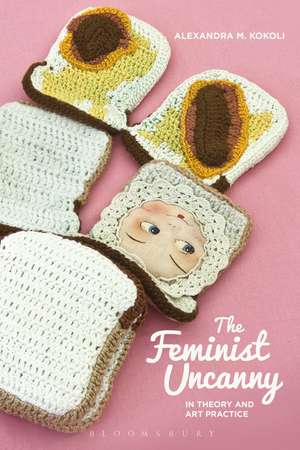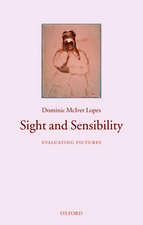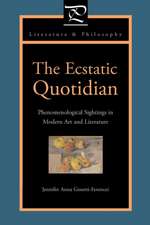The Feminist Uncanny in Theory and Art Practice: Bloomsbury Studies in Philosophy
Autor Alexandra M. Kokolien Limba Engleză Paperback – 29 noi 2017
| Toate formatele și edițiile | Preț | Express |
|---|---|---|
| Paperback (1) | 237.28 lei 6-8 săpt. | |
| Bloomsbury Publishing – 29 noi 2017 | 237.28 lei 6-8 săpt. | |
| Hardback (1) | 773.65 lei 6-8 săpt. | |
| Bloomsbury Publishing – 10 aug 2016 | 773.65 lei 6-8 săpt. |
Din seria Bloomsbury Studies in Philosophy
- 13%
 Preț: 257.50 lei
Preț: 257.50 lei - 13%
 Preț: 256.77 lei
Preț: 256.77 lei - 22%
 Preț: 256.20 lei
Preț: 256.20 lei - 22%
 Preț: 257.03 lei
Preț: 257.03 lei - 13%
 Preț: 255.47 lei
Preț: 255.47 lei - 22%
 Preț: 257.50 lei
Preț: 257.50 lei - 22%
 Preț: 773.81 lei
Preț: 773.81 lei - 13%
 Preț: 256.20 lei
Preț: 256.20 lei - 22%
 Preț: 258.89 lei
Preț: 258.89 lei - 13%
 Preț: 255.11 lei
Preț: 255.11 lei -
 Preț: 256.20 lei
Preț: 256.20 lei - 22%
 Preț: 772.58 lei
Preț: 772.58 lei - 22%
 Preț: 240.50 lei
Preț: 240.50 lei - 22%
 Preț: 257.03 lei
Preț: 257.03 lei - 23%
 Preț: 255.84 lei
Preț: 255.84 lei - 23%
 Preț: 255.29 lei
Preț: 255.29 lei - 13%
 Preț: 237.28 lei
Preț: 237.28 lei - 13%
 Preț: 235.00 lei
Preț: 235.00 lei -
 Preț: 258.42 lei
Preț: 258.42 lei -
 Preț: 256.49 lei
Preț: 256.49 lei - 14%
 Preț: 773.06 lei
Preț: 773.06 lei - 30%
 Preț: 774.03 lei
Preț: 774.03 lei - 30%
 Preț: 774.20 lei
Preț: 774.20 lei - 30%
 Preț: 774.86 lei
Preț: 774.86 lei
Preț: 237.28 lei
Preț vechi: 305.51 lei
-22% Nou
Puncte Express: 356
Preț estimativ în valută:
45.42€ • 47.23$ • 38.06£
45.42€ • 47.23$ • 38.06£
Carte tipărită la comandă
Livrare economică 14-28 martie
Preluare comenzi: 021 569.72.76
Specificații
ISBN-13: 9781350060784
ISBN-10: 135006078X
Pagini: 560
Dimensiuni: 156 x 234 x 23 mm
Greutate: 0.34 kg
Ediția:NIPPOD
Editura: Bloomsbury Publishing
Colecția Bloomsbury Academic
Seria Bloomsbury Studies in Philosophy
Locul publicării:London, United Kingdom
ISBN-10: 135006078X
Pagini: 560
Dimensiuni: 156 x 234 x 23 mm
Greutate: 0.34 kg
Ediția:NIPPOD
Editura: Bloomsbury Publishing
Colecția Bloomsbury Academic
Seria Bloomsbury Studies in Philosophy
Locul publicării:London, United Kingdom
Caracteristici
Examines the relationship between feminism and the uncanny in theoretical texts and feminist art practice.
Notă biografică
Contact Biography59Alexandra M. Kokoli is Senior Lecturer in Visual Culture - Fine Art at Middlesex University, and Research Associate at the Visual Identities in Art and Design (VIAD) Research Centre, University of Johannesburg. She is the editor of Feminism Reframed: Reflections on Art and Difference (2008) and Susan Hiller, The Provisional Texture of Reality: Selected Talks and Texts, 1977-2007 (2008).
Cuprins
TOCIntroduction: Why Witches?Part 1 ('Theory')Chapter 1: The Uncanny FeminineChapter 2: The Feminist UncannyPart 2 ('Practice')Chapter 3: 'Moving Sideways' and Other Dead Metaphors: Susan Hiller's ParaconceptualismChapter 4: Squats and Evictions: The Uncanny as UnhomelyChapter 5: Dinner Parties: Eating Out, Coming TogetherChapter 6: Legions ('For we are many')Chapter 7: Family Albums: World Making as CompensationPostscript A: The Academic OnePostscript B: The Melancholic OneBibliographyIndex
Recenzii
A powerful feminist critique of not only the home, but a number of borders and boundaries.
The Feminist Uncanny in Theory and Art Practice provides a much needed remedy of the Freudian uncanny for a feminist art history. Kokoli's intertextual coupling of 'woman' and the 'unhomely' unhinges the uncanny from castration and propagates it in a novel series of 'domestic' spheres in work by women artists and collectives. Whether in the postal art of Feministo or the paraconceptualism of Susan Hiller, Kokoli's feminist uncanny transforms homelessness into a home which is strange, subversive and revels in its ambivalence. The Feminist Uncanny in Theory and Art Practice is set to become a core curriculum text.
This book is an essential reading for anyone interested in the productive yet troubling collaboration and contradictions between feminism and the theoretical apparatus of psychoanalysis. Kokoli proposes the feminist uncanny as the site of this critical encounter, exploring the multiple definitions of the concept and offering new readings of prominent feminist artworks as well as less well known projects.
In The Feminist Uncanny, Alexandra Kokoli brings the psychoanalytic and political registers of domestic space into tension through a new dialogue of the uncanny with feminist artistic practices. Offering the reader deeper insights into the unsettling nature inherent in such practices of resistance and liberation, Kokoli makes an important original contribution to contemporary feminist scholarship.
In this fascinating book, Alexandra Kokoli pursues the thread of the 'uncanny', taking it from Freud through interlocking and mutually interrogating layers of theory, to reveal its potential in feminist fine art. The heterogeneous range of art work engaged with enables Kokoli to expose and examine the broader, subversive significance of the 'feminist uncanny', opening up an innovative, unsettling and rewarding approach to feminist fine art practices.
Alexandra Kokoli's The Feminist Uncanny is a smart and engaging re-evaluation of the long-standing troubled relationship between feminism and psychoanalysis, and its complex manifestation in feminist art practice. Kokoli not only offers a series of deft analyses of the diverse provocations made by this genealogy but, focusing on the marginal yet powerful spaces of femininity within culture, rethinks the feminist calling card that the 'personal is political'.
The Feminist Uncanny in Theory and Art Practice provides a much needed remedy of the Freudian uncanny for a feminist art history. Kokoli's intertextual coupling of 'woman' and the 'unhomely' unhinges the uncanny from castration and propagates it in a novel series of 'domestic' spheres in work by women artists and collectives. Whether in the postal art of Feministo or the paraconceptualism of Susan Hiller, Kokoli's feminist uncanny transforms homelessness into a home which is strange, subversive and revels in its ambivalence. The Feminist Uncanny in Theory and Art Practice is set to become a core curriculum text.
This book is an essential reading for anyone interested in the productive yet troubling collaboration and contradictions between feminism and the theoretical apparatus of psychoanalysis. Kokoli proposes the feminist uncanny as the site of this critical encounter, exploring the multiple definitions of the concept and offering new readings of prominent feminist artworks as well as less well known projects.
In The Feminist Uncanny, Alexandra Kokoli brings the psychoanalytic and political registers of domestic space into tension through a new dialogue of the uncanny with feminist artistic practices. Offering the reader deeper insights into the unsettling nature inherent in such practices of resistance and liberation, Kokoli makes an important original contribution to contemporary feminist scholarship.
In this fascinating book, Alexandra Kokoli pursues the thread of the 'uncanny', taking it from Freud through interlocking and mutually interrogating layers of theory, to reveal its potential in feminist fine art. The heterogeneous range of art work engaged with enables Kokoli to expose and examine the broader, subversive significance of the 'feminist uncanny', opening up an innovative, unsettling and rewarding approach to feminist fine art practices.
Alexandra Kokoli's The Feminist Uncanny is a smart and engaging re-evaluation of the long-standing troubled relationship between feminism and psychoanalysis, and its complex manifestation in feminist art practice. Kokoli not only offers a series of deft analyses of the diverse provocations made by this genealogy but, focusing on the marginal yet powerful spaces of femininity within culture, rethinks the feminist calling card that the 'personal is political'.




















